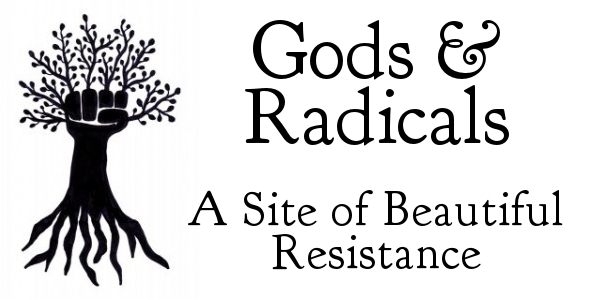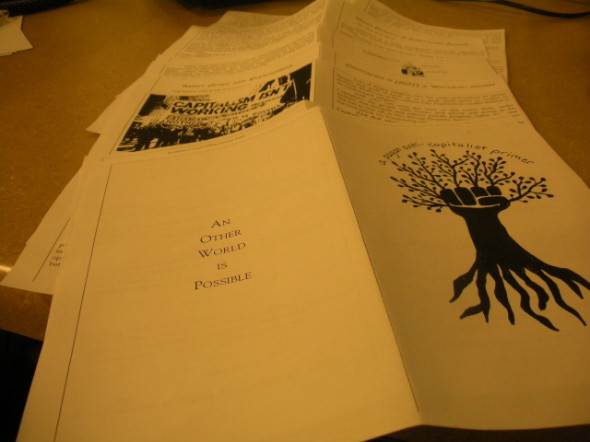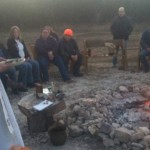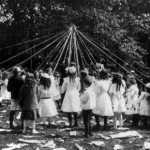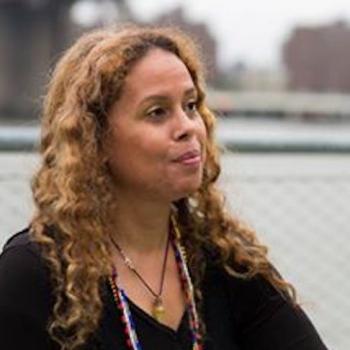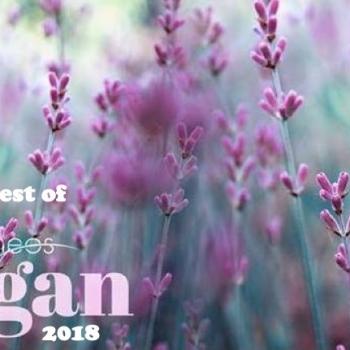Greetings everyone! With life being busy I took a brief break from my interview column. I thought I’d start back up with one of the more interesting voices in paganism today—Rhyd Wildermuth. Rhyd is the co-founder of the website Gods and Radicals and has a new book published called A Kindness of Ravens. I found his answers compelling, and it has led me personally to a greater understanding about his point of view with both politics and paganism. I hope you enjoy reading this as much as I enjoyed giving the interview.
Blessings, Sean W Harbaugh
Sean Harbaugh: Rhyd, thank you for taking time for this interview. I am honored. So, we’ll start off with the basic question, can you please tell us about yourself? A little about your education and upbringing?
Thanks, this is fun!
Rhyd Wildermuth: So, uh, upbringing. I was born in the poorest part of the United States, Appalachia. I spent my pre-adolescence in a leaking A-Frame house in a clay pit with an open sewer, about ten miles from a leaking nuclear plant which killed my uncle and papaw and gave lots of other people birth defects. The same distance away in a different direction was a paper mill where my abusive father sometimes worked.
My developmentally-disabled mother moved my sisters and I to south Florida when I was 12. She had a schizophrenic break soon after, would argue aloud with demons telling her to kill her children and would sign her entire paychecks from her job at Burger King over to a megachurch.
So, my upbringing? Abject poverty, parental abuse, industrial waste. And lots of books.
I read. I devoured everything. My father would leave me at the public library when I was a kid and forget about me. I’d be there for 6 hours waiting for him to pick me up. Which, when you’re a kid surrounded by books, that’s hardly a horrible thing. Later, missed 194 days of high school because I had to start working at 14 to support my younger sisters and mother. Managed a 3.5 anyway, thanks to books.
So, self-taught, self-upbrought. Never stopped, either.
How did your pagan path evolve? Can you describe your personal practice?
Most of my early paganism came from nature and staring at the stars. Still does, I think. But not ‘wild nature,’ as it were. The bits of forest that exist near highway on-ramps or abandoned lots. The nature that arises in the places human plans fail, in the places humans can’t develop. In Seattle, you can find bits of chamomile growing in the cracks of sidewalks. That’s the nature of my paganism.
My practice? Interesting that I never get asked this. Thanks. I talk to gods when they want to talk, to dead things when they want to be talked to. And to trees. I’m a literal tree-hugger. Sometimes I’ll just lean my face into the bark of an Alder or a Birch and sigh. I also have long conversations with Rosemary, and with streams and corvids. Lots of staring at the sky in the reflection of puddles, gaping slack-jawed in awe at the Salish Sea or the mountains.
And of course I do the ‘indoor’ stuff. An altar, usually crowded with bits of nature. Lots of feathers, particularly, and strange sacred rocks and shells and other things that want to come inside. Candles and cups of tea for those that like them. Rituals when needed, but most of my life is a bit of a waking ritual.
You’re an activist. What motivates you? What keeps you going? How do you not allow the detractors to demotivate what you are doing?
Activist is a funny word. It’s the opposite of passive-ist, perhaps? I’ve never really felt like it describes me all that well, though. I’ve done ‘activism,’ definitely, though for most of the last six years, working with homeless and formerly homeless vulnerable people has been my job, not my activism. And my writing could maybe be called ‘activism,’ but it’s mostly just words on the internet attempting to coax others into not looking away from the horrors of the world.
What motivates me is my certainty that horrors like homelessness and war and destruction of nature aren’t actually how most people want the world to be. If most people were able to embody the truth that our automobiles are powered by oil made possible by the killing of Arabs and Africans (like in Nigeria), that much of our cheap technology is possible by near-slave labor in cramped factories, or that Capitalism itself is founded on slaughter, oppression, destruction, and displacement, they’d want to change things. So, that’s my activism currently—helping people see those connections, helping them through the grieving process such awareness causes, and then empowering them to change it, because I can’t do it alone.
Detractors don’t de-motivate me, but they do sometimes distract and derail me when the they attack my personal life or even endanger my friends. But mostly, the vitriol is similar to what I see in social work with folks who feel personally powerless, particularly those with personality disorders. There’s always some ancient pain somewhere they haven’t been able to overcome, and that often leads to social violence. I try to have the same understanding for them that I do for the homeless, vulnerable, and mentally-ill folk I work with. But only the latter group actually benefits from my care and sympathy.
You co-founded the website Gods and Radicals, which has come under fire lately. Tell us how G&R came to existence, and what role you feel it fills within the pagan umbrella?
I guess it did sort of come under fire, huh? But Gods&Radicals is already fire, so adding fire to fire just makes more fire.
Alley Valkyrie and I came up with the idea after giving a presentation about Capitalism and Paganism to a very crowded room full of amazing people at Pantheacon. We’d both noticed that anytime we’d talk about these things, people would get really excited. We’d both get emails from readers of our work, thanking us for finally talking about stuff that Pagans used to talk about and telling us they were inspired to talk about it too. And here we are in this packed room, and suddenly we realize, oh. We just need more space to talk about these things.
And, of course, it sorta caught on fire, and caught other things on fire, and suddenly there’s this fierce, burning desire to change stuff within and through Paganism and all its related threads.
Our place within the Pagan umbrella? I think I’d like to borrow druid and scholar Jonathan Woolley’s analogy. We’re not so much an umbrella or a tent, but a carnival that sort of keeps going.
One of the most beautiful—and important—things about Gods&Radicals that I’m utterly in awe of is how there are writers and readers from every Pagan tradition. It was started by a few polytheists, but it’s not just written or read by polytheists. We have ceremonial magicians, traditional witches, Druids, ‘hard’ polytheists, re- constructionists, Feri witches, Dianics, Wiccans, Heathens, Humanists, and plenty of non-aligned Pagans writing with us.
So, Gods&Radicals is proving not only that we can all get along, but that people from all various groups can actually build something together, and something that actually has deep relevance not just for Pagans, but for non-Pagans too.
How does politics play into paganism, and why do you think so many people have attacked you and others personally lately?
Politics relates to everything, because politics is just the word we use to describe the way power and influence play out in social interactions. There are political theories and frameworks and parties, of course, but that’s just what comes when people try to figure out how to understand, harness, fight, or establish power.
How specifically anti-Capitalist and anti-Authoritarian politics plays into Paganism, though—that’s where most of the contention is. There has always been an anti-Authoritarian current in Paganism, and there have always been people who want to make it more Authoritarian, either to have leaders they can follow or, more often, to become the leaders other people will follow. And while I’m not against leadership per se, the desire to have power-over people—especially when it comes to power-over other people’s conceptions of the gods—is something I think we must always resist in our communities.
I do make a distinction between criticism and attacks, though. Criticism is thoughtful, curious. Questions about implications, desire for clarifications, counter-arguments that create more understanding. Criticism is the most important thing to any theology, philosophy, theory, or politics. Without it, it’s just opinion.
The personal attacks you mention, though? Those got kinda ugly. While I’m quite used to bearing and shaking off the hatred of others (being queer, being abused as a child, being poor—all those things teach endurance and self-possession), the personal attacks on friends of mine, supporters, and writers at Gods&Radicals were really sad. I think what was most disturbing, however, was the great silence and even encouragement of such actions from many high-profile American polytheist leaders and groups while all that happened, with the notable exception of John Beckett.
But why all the aggression and personal attacks? There’s a saying that when Shakti awakens, Shiva courts. Or, basically, when consciousness and awareness arise, energy—and sometimes violence—greet it. I see it in social work often, uncentered rage over difficult-to-acknowledge truths. Eventually they balance and dance together, or there’s violence, or the truth is suppressed. In any case, Gods&Radicals won’t be going away.
In your book A Kindness of Ravens you describe a very rough upbringing. How do you think that affects both your religion and your politics?
It’s funny. I never fully realized my early life was ‘rough’ until I’d tell stories about it and have friends and lovers freak out in terror, or cry about it, or offer condolences. It just was, you know? And I still experience this disconnect when talking about politics and religion now, forgetting that many (primarily white Americans) never actually saw the sorts of things I saw. They had dinner every night, their food didn’t get delivered by government truck, they didn’t have to burn coal in a woodstove to keep warm, they weren’t abused, they didn’t have to raise their younger sisters by themselves, their mother didn’t scream at demons: basically, many never learned to look directly at such suffering and contemplate ways to stop it.
I don’t regret my childhood one bit, though, as it gave me precisely the insight I needed into what America and Capitalism are all about. Fantasies about wealth and comfort and modernity mean nothing to me, propaganda about Capitalism and how America is such a great and free place doesn’t work on me.
My politics starts there, and with the homeless people I work with. Seeing the crowded, piss-soaked shelters or alleyways in which are piled the broken bodies and shattered minds of soldiers, immigrants, First Nations peoples, the descendants of slaves from Africa, and the poor—seeing that can’t help but make you a revolutionary.
For me, it’s also what makes me a pagan. Those people are the people of the earth. They’re treated exactly like the rest of Nature—used up, consumed, poisoned, and then thrown away. Like all the polluted water and air and soil in Appalachia, they are destroyed so other people elsewhere can have nice things. There’s no difference between them, and that’s part of why I say there’s no difference between my Paganism and my politics.
You also go into descriptions about walking the lands of our European ancestors. You’re also going back very soon. Describe what you feel when you are there.
Recently, I feel a little weird about calling them “our European ancestors,” or even European at all. Many—but not all—of my ancestors once had a relationship with lands in the place we call Europe, and I go to visit those places, the way one might visit distant cousins. And of course, there are plenty of Pagans whose ancestors did not have relationships with the land now called Europe, and European ancestral identity is deeply entwined with Nationalist, Fascist, and Racist projects both in Europe and the United States. But yeah, some of my ancestors lived in Europe.
When I go to Europe, though, it’s more to find fragments of forgotten mysteries than to connect to the places my blood ancestors dwelt. Some of my gods inhabit certain places stronger there than here, like Brân and Arianrhod in Wales. But then, so do certain ghosts, certain memories, certain magicks which witnessed the horror of Capitalism’s birth and ensuing destruction of nature and humans. The old stones there, the ancient tracks, the fallen shrines and mist-shrouded lakes, the breathing mountains and the reborn forests all whisper secrets, just as the places in North America or anywhere else do.
There’s another reason, though. The cities and societies in Europe make a lot more sense to me, particularly those in France and Germany. Cities built around people, not cars. Public transportation available anywhere I go for a lot cheaper than any city in the United States. Societies built less around work-identity and more around social community. Europe’s one of the few places I feel free, and it’s no wonder it’s easier to hear my gods there.
Back to politics. What is your view on the state of capitalist society as a whole? Do you really think pure Marxism is the answer or is it somewhere in between?
Pure Marxism? That’s like saying “pure” Paganism! And I’m a proud heretic within both.
But actually, this is a great opportunity to explain what I mean when I say I’m a Marxist, particularly for American readers who were taught to fear Marx as a dangerous man.
Marxism, if anything, is a way of seeing social relationships through their physical and earth-derived functions, rather than most of the pretty myths we overlay atop them. It’s a way of drawing connections between things that exploitative people don’t want us to notice, and cutting through the pseudo-spirituality of Capitalist society.
The basic tenet of Marxism is this: humans are currently alienated from their own labor and the things they produce. In this way, it’s the same as one of the basic tenets of most Paganisms, that humans are currently alienated from their own existence as part of nature. Both try to uncover the causes of that alienation and rectify it. All the other stuff—the ways of actually going about fixing this relationship, are tertiary.
And of course, there’s dogmatic, orthodox, fundamentalist, and even totalitarian currents in both Paganism and Marxism. Authority sneaks in whenever someone wants to use something for their own gains and wants others to submit to them, suggesting a one-true way, be that submission to priests, traditions, political parties, or to States. That’s why both my Paganism and my Marxism are mediated through Anarchism. Basically, Many Gods, No Masters.
My suspicion is that the only way to get ourselves out of the mess we’re in is to own both our own power and our own responsibility, rejecting every would-be Authority in favor of our own. No leaders will ever fix the world for us, no god will swoop in to save us from ourselves, no ideology or religion or technology can ever make up for our abdication of personal power and refusal to see our interconnected existence.
It’s always and only up to us.
Outside of writing and activism, what is your greatest passion?
There are a few. My lover, who’s really amazing and reminds me that I am a body. Music, which does the same. And forests. Always forests.
Thank you for answering my questions. Do you have anything else you’d like to add?
Thank you! And um, I’ll be in pilgrimaging in Europe for the next few months, and so purchases of A Kindness of Ravens will help me stay there longer, which means I’ll have more stuff to write about.
Be well!
Editor’s Note: Keep up with Rhyd at Gods&Radicals, and at his own website Pagan Arch.



